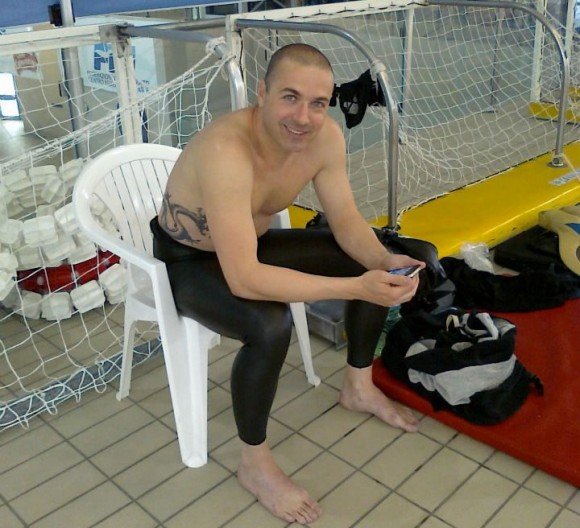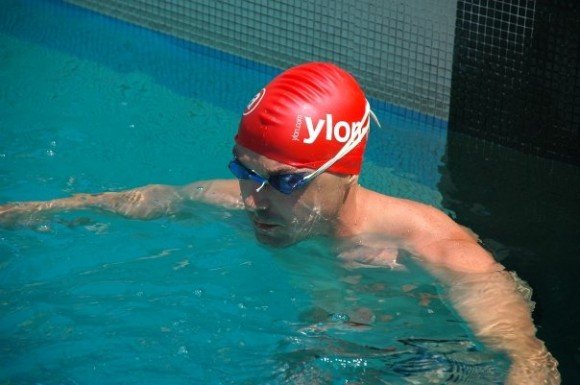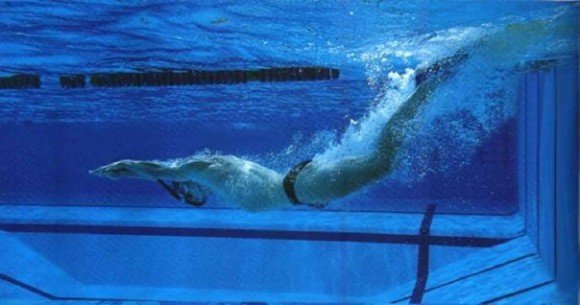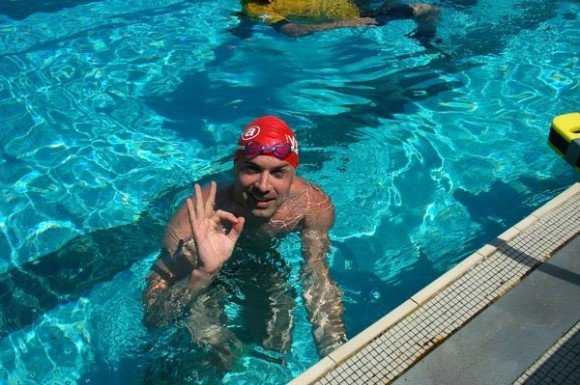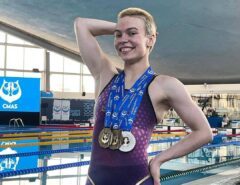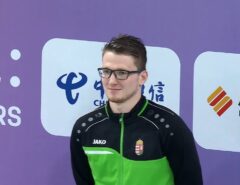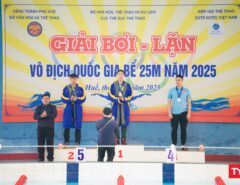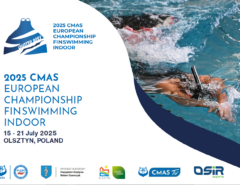1) Hello Theo tell us something about yourself, your history (beginning with Finswimming and the jump to the Apnea) and what you do in your life now (study in the past, job, hobbies,…)
Hi Davide. Thank you for your interest about my performance. My name is Theo-Patrick Fourcade, I studied at the University to be a Sport Teacher. But I am no more teacher now. I opened two Small companies one for selling the products of my brand «Ylon-a ®» and one trading company in Hong Kong for foreigner companies which are looking for chinese suppliers. My hobbies are swimming, traveling, talking, reading, listening musics, eating in good restaurants with friends and drinking coffee with a french croissant just after the morning’s training with my coach. I started to practice finswimming in 1991. Before I was practicing gymnastic and athletic (100m : 10″80). I saw for the first time Finswimming on the tv in France. Just after I was looking for a club in my town. I was lucky because inside this club (now called Toulouse Olympique Palme – T.O.P.) were training famous French Finswimmers (Benoit Castera, Nicolas Achte, Breidenbach Laurent, Elodie Chaigneau, Céline Carel). I started to be friend with them and after 6 years I joined them in the French Team, in which I was swimming 50m apnea, 100m immersion and the relays 4×100 and 4×200. In 2006 I stopped Finswimming and I tried apnea. It was like normal that I swam in apnea because I always liked it. But it is not the same sport and I had some difficulties to confirm some performances. Last year the Hong Kong Federation (HKUA) offered me to join the national team of Hong Kong. Because I was Hong Kong’s resident, the CMAS had accepted the deal. I am really happy that this Best World Performance belongs now to HKUA, and I hope that I could confirm my performances in the others disciplines.
2) You are the revelation in the World of the Dynamic Apnea, after the World’s Best Performance a few days ago, with 36″36 in the 100 Speed Apnea, how did you get it?
I hope that people will have more interest for this kind of race. Speed apnea is a really special track, very interesting to swim. My coach, Michail Kichev, is really good and we do really amazing exercices. About my trainings, what I can say, is that I am always underwater! My past of Finswimmer and my work like free diver these last years help me a lot for this performance.
3) Finswimming vs Apnea…two worlds at the same time aesthetically similar but totally different in the spirit, what differences do you see between them?
There is a really strong free diver spirit. The first most important thing for a free diver is to be underwater, for long time and if they can choose of course it’s better in the sea. Free divers are really quiet before and during the competiton, there is no noise in the swimming pool and in the area. Everybody are concentrate and wait their time to compete. The first quality for a free diver is his aptitude to control the stress and the psychologic pain when you have less and less oxygen during the performance. When all the people in the World go out of the water because they want to breath the free diver stay quiet and stay underwater and go out later really quietly. Finswimmers are like noisy warrior, powerful and speed. You can see the war in the pool. For free divers the war is Inside them. The bridge between the two sports is the monofin. Speed apnea can be a really good way for free divers to train technic of Finswimming. I think this track is really important for Apnea development, because at least the best free divers will be also really good Finswimmers.
4) What do you like about the Finswimming? And what do you hate? And about the Apnea?
In Finswimming I like the speed, the waves during relays, the fight into the lane. In finswimming I hate nothing even when I vomited after lactic trainings. In apnea I like to be underwater and staying long time concentrate.
5) You surely have points of reference (people you admire), who are they in the Finswimming and in the Apnea?
For me the Finswimming champions are:
– A friend of mine, when I started to swim, he gives me the motivation to train and advices to have better results : Benoit Castera (he was also my coach before Michail Kichev).
– Some Finswimers from the USSR team (1992) : Konstantin Koudriaev, Serguey Akhapov, Andrei Gorbounov, Larissa Boutenko. I met them when I was beginner, it was great.
– Champion in Apnea : Jacques Mayol. I admire also the performance from Golan Gorak 273m !
6) You said that you are living between Toulouse (France) and Hong Kong. How do you manage your trainings? Who helps you in HK?
When I am in France I swim in my old club : Monday to friday 6h45 to 8h15 and 12h to 14h. When I am in Hong Kong I have also schedules (my next schedules will be 9h to 11h). If I want, I can also train in Guangzhou with the old coach from Chen Bin. In Hong Kong I can train with my club Tsuen Wan Association Sport Finswimming. The responsables of the team are also members of HKUA (Hong Kong Underwater Association), a lot of people help me, all the responsables help me, they are really great.
7) How is seen Finswimming in Hong Kong? And Apnea? Are they famous? Or it’s like here, niche sports (practiced by few ppl)?
It is like here, niche sports. Like here people who want to develop Finswimming are really motivated. There is a real structure and I am sure they will come on the international place in the next following years, they really want it. Apnea is really new in Hong Kong I hope I can train some athletes for the next years.
8) Did you meet a lot of friends with these two sports? Are you always in contact with?
Yes, i met a lot of friends since the beginning. Finswimming and Apnea are a big family all over the World. What is amazing is where ever you go you can be helping by friends all over the World. It is like obligation for me to make the same things. So welcome everybody to Hong Kong!
9) Who would you like to thank for the targets you got? Like the past in the National Team and the Best Performance in 100 Speed Apnea 36″36?
Of course I want to thank my trainer Michail Kichev and all my trainers since the begining : Philippe Labeyrie, Sophie Achte-Blondel, C. A.-G. and Benoit Castera. I want to thank also all the HKUA and TSWA in Hong kong : David, Anny and all the others who give me the opportunity to try this performance.
10) Tell us everything you want!
Take your marks…….TUUUUUUUUUUUUT
Video of 36″36 100 mt Speed Apnea
1) Ciao Theo raccontaci qualcosa su di te, la tua storia (iniziando dal Nuoto Pinnato e il passaggio all’Apnea) e cosa fai nella tua vita attualmente (studi passati, lavoro, hobby,…)
Ciao Davide. Grazie per il tuo interesse per la mia prestazione. Il mio nome è Theo-Patrick Fourcade, ho studiato all’università per diventare insegnante Sport. Ma attualmente non pratico più questo mestiere. Ho aperto due piccole imprese, una per vendere i prodotti del mio marchio «Ylon-a ®» e una società commerciale a Hong Kong per le aziende straniere che sono alla ricerca di fornitori cinesi. I miei hobby sono il nuoto, i viaggi, parlare, leggere, ascoltare musica, mangiare nei ristoranti buoni con amici e bere caffè con croissant francesi poco dopo l’allenamento del mattino con il mio allenatore. Ho iniziato a praticare il Nuoto Pinnato nel 1991. Prima praticavo ginnastica e atletica (100 metri: 10″80). Ho visto per la prima volta il Nuoto Pinnato in tv in Francia. Subito dopo ero alla ricerca di un club nella mia città e sono stato fortunato, perché all’interno di questo club (ora chiamato Toulouse Olympique Palme – TOP) erano presenti famosi nuotatori francesi (Benoit Castera, Nicolas Achte, Breidenbach Laurent, Elodie Chaigneau, Céline Carel) siamo così diventati amici e dopo 6 anni mi unii a loro nella squadra nazionale francese, nella quale gareggiavo nei 50m apnea, 100m immersione e nelle staffette 4×100 e 4×200. Nel 2006 ho smesso il Nuoto Pinnato e ho provato l’Apnea. Era normale per me poichè gareggiavo sott’acqua in apnea, mi è sempre piaciuta. Ma non è lo stesso sport e ho avuto qualche difficoltà a confermare alcune prestazioni. L’anno scorso la Federazione di Hong Kong (HKUA) mi ha offerto di entrare nella squadra nazionale di Hong Kong. Perché ero residente di Hong Kong, la CMAS accettò l’accordo. Sono davvero felice che questa Miglior Prestazione Mondiale appartiene alla HKUA, e spero che mi possa aiutare a raggiungere altri traguardi nelle altre discipline.
2) Tu sei una delle rivelazioni nel mondo dell’Apnea Dinamica, dopo la Miglior Prestazione Mondiale di qualche giorno fa, con 36″36 nei 100 Speed Apnea, come l’hai ottenuto?
Spero che la gente avrà più interesse per questo tipo di gara. La Speed Apnea è una gara davvero speciale, molto interessante da nuotare. Il mio allenatore, Michail Kichev, è veramente buono e facciamo esercizi veramente sorprendenti. Riguardo i miei allenamenti, quello che posso dire, è che io sono sempre sott’acqua! Il mio passato di Pinnatista e il mio lavoro come apneista in questi ultimi anni mi hanno aiutato molto per questa performance.
3) Nuoto Pinnato vs Apnea…due mondi allo stesso tempo esteticamente simili ma totalmente differenti nello spirito, quali differenze noti tra di essi?
C’è uno spirito molto forte negli apneisti. La prima cosa, la più importante, per un apneista è quello di essere sott’acqua, per lungo periodo di tempo e se loro possono scegliere, in mare è molto meglio. Gli Apneisti sono molto tranquilli prima e durante “la gara”, non c’è alcun rumore in piscina o in mare. Tutti sono concentrati e aspettano il loro turno di partenza. La prima qualità di un apneista è la sua attitudine a controllare lo stress e il dolore psicologico quando si ha sempre meno ossigeno durante la performance. Mentre tutte le persone normali nel mondo vogliono uscire fuori dall’acqua perché vogliono respirare, l’apneista sa stare tranquillo e rimane sott’acqua e esce più tardi molto tranquillamente. I Pinnatisti sono come guerrieri rumoroso, potenti e veloci. Potete assistere ad una guerra in piscina. Per gli apneisti la guerra è dentro se stessi. Il ponte tra i due sport è la monopinna. La Speed Apnea può essere davvero un buon modo per gli apneisti di apprendere le tecniche del Nuoto Pinnato. Penso che questa gara è davvero importante per lo sviluppo dell’apnea, perché almeno i migliori apneisti sarebbero anche ottimi nuotatori.
4) Cosa ti piace e non ti piace per ciascuno dei due Sport?
In Nuoto Pinnato Mi piace la velocità, le onde durante le staffette, la lotta in corsia. Mi piace qualsiasi cosa, anche quando ho vomitato dopo gli allenamenti lattacidi. In apnea mi piace essere sott’acqua e rimanere concentrato per molto tempo.
5) Sicuramente hai dei punti di riferimento (persone che ammiri), chi sono nel Nuoto Pinnato e nell’Apnea?
Per me i campioni sono Nuoto Pinnato:
– Un mio amico, quando ho iniziato a nuotare, mi dava la motivazione per allenarmi e consigli per avere migliori risultati: Benoit Castera (era anche il mio allenatore prima di Michail Kichev).
– Alcuni Pinnatisti dell’URSS (1992): Konstantin Koudriaev, Serguey Akhapov, Andrei Gorbounov, Larissa Boutenko. Li incontrai quando ero alle prime armi, è stato fantastico.
– Campioni in Apnea: Jacques Mayol. Ammiro anche la performance di Golan Gorak 273m in dinamica!
6) Prima ci hai detto che viti tra Tolosa (Francia) e Hong Kong. Come gestisci i tuoi allenamenti? Chi ti segue ad HK?
Quando sono in Francia, nuoto nel mio vecchio club: da lunedi a venerdì 18.45 – 20.15 e dalle 12.00 alle 14.00. Quando sono a Hong Kong anche li ho gli orari fi allenamento (i miei prossimi allenamenti saranno dalle 9.00 alle 11.00). Se voglio, posso anche allenarmi a Guangzhou con l’allenatore vecchio di Chen Bin. A Hong Kong, posso allenarmi con il mio club Tsuen Wan Association Sport Finswimming. I Responsabili del gruppo sono anche membri della HKUA (Hong Kong Underwater Association), un sacco di gente mi aiuta, tutti i responsabili mi aiutano, sono davvero grande.
7) Come è visto il Nuoto Pinnato a Hong Kong? E l’Apnea? Sono sport famosi? Oppure è come qui, sport di nicchia (praticati da poche persone)?
E ‘come qui, uno sport di nicchia. Come qui le persone che vogliono sviluppare il Nuoto Pinnato sono realmente motivate. C’è una vera e propria struttura e sono sicuro che arriveranno alle gare internazionali nei prossimi anni, lo desiderano realmente. L’Apnea è veramente una novità ad Hong Kong e spero di poter allenare alcuni atleti in futuro.
8) Hai conosciuto molti amici in questi due sports? Sei sempre in contatto con loro?
Sì, ho incontrato un sacco di amici fin dall’inizio. Il Nuoto Pinnato e l’Apnea sono come una grande famiglia in tutto il Mondo. La cosa stupefacente è che in qualsiasi posto tu vada ci sono sempre amici disposti ad aiutarti. E a me viene naturale fare la stessa cosa. Quindi sarete tutti benvenuti ad Hong Kong!
9) Chi vuoi ringraziare per i risultati che hai ottenuto? Intendo per la Nazionale di Nuoto Pinnato e la Miglior Performance Mondiale nei 100 Speed Apnea 36″36?
Naturalmente voglio ringraziare il mio allenatore Michail Kichev e tutti i miei allenatori dal l’inizio: Philippe Labeyrie, Sophie Achte-Blondel, CA-G. e Benoit Castera. Voglio ringraziare anche tutta la HKUA e la TSWA a Hong kong: David, Anny e tutti gli altri che mi danno l’opportunità di raggiungere la mia performance.
10) Dicci quello che ti pare!
A posto…….TUUUUUUUUUUUUT
Video del 36″36 100 mt Speed Apnea
httpv://youtu.be/GPecjR2mHoI

